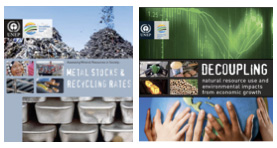The European Commission and the UN Environment Programme have jointly launched reports on metal recycling and decoupling.
One finds that increased rates of metal recycling, through better collection systems and recycling infrastructure, could generate significant numbers of green jobs.
The other suggests three scenarios to decouple economic growth from natural resource consumption through resource efficiency.
 26 May 2011: The European Commission and the UN Environment Programme (UNEP) have jointly launched reports on metal recycling and decoupling, during Green Week in Brussels, Belgium.
26 May 2011: The European Commission and the UN Environment Programme (UNEP) have jointly launched reports on metal recycling and decoupling, during Green Week in Brussels, Belgium.
The first report, titled “Recycling Rates of Metals,” warns that without radical changes to metal recycling practices, critical, specialty and rare earth metals could become essentially unavailable for use in modern technology. Boosting recycling rates through better collection systems and recycling infrastructure, especially in developing countries, could reduce greenhouse gas emissions (GHGs) and generate potentially significant numbers of green jobs. Recycling metals is between 2 and 10 times more energy-efficient than smelting metals from virgin ores, according to the report.
The second report, titled “Decoupling natural resource use and environmental impacts from economic growth,” focuses on the extraction of four categories of primary raw materials and suggests that decoupling will require significant changes in government policies, corporate behavior, and consumption patterns by the public. The report calls for a transition to a more sustainable global economy, with a focus on absolute resource use reductions in developed economies and relative decoupling in developing economies.
By showing data and figures on natural resource flows worldwide and four country studies (China, Germany, Japan and South Africa), the report highlights that consumption of natural resources is still rising. With “business as usual,” it finds resource consumption would increase to three times its current level by 2050, resulting in the annual consumption of 140 billion tons of minerals, ores, fossil fuels and biomass. The report notes that some advanced countries deal with the problem of high resource intensity by “exporting” it elsewhere, and that trade increases energy use and resource flows. However, there is promising indication from China of a national effort to achieve some decoupling through modernization of the economy and policies to reduce resource intensity.
Three scenarios are suggested to “decouple” economic growth from the rate of natural resource consumption through an increase in resource efficiency. The most ambitious scenario calls on the developed world to reduce per capita use by two-thirds, with other countries remaining at today’s levels, so that resource consumption could remain at 2000 levels. [EU Press Release] [Publication: Decoupling Natural Resource Use and Environmental Impacts from Economic Growth] [Publication: Recycling Rates of Metals]